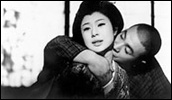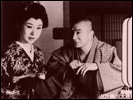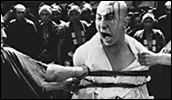Secrets of a Court Masseur
- Year
- 1960
- Original title
- Shiranui Kengyo
- Japanese title
- 不知火検校
- Alternative title
- Agent Shiranui
- Director
- Cast
- Running time
- 91 minutes
- Published
- 29 September 2006



by Tom Mes
Though its title might lead some viewers to mistake it for a jolly sex comedy in the British Confessions of a Window Cleaner mould, the Shintaro Katsu-starring Secrets of a Court Masseur is in fact one of the darker exponents of the Daiei studio's prolific chanbara movie production line of the 1950s and 60s.
Born without eyesight, Ichi learns from childhood how to turn his handicap to his own advantage, scheming money and sake from gullible passers-by in order to support his penniless mother. As a young man he is trained as a masseur at a school for the blind, led by the Shiranui Kengyo, one of the land's most respected masseurs and acupuncturists, who counts the shogun himself among his clientele. Despite being far from the most talented pupil in the school, Ichi has a burning ambition to succeed the Kengyo, but the venerated one merely derides him for being foolish. Ichi's talents for schemes, however, have only improved since his childhood days. Never hesitant to pick the purse off a dead man or take advantage of a damsel in distress, he lives off the healthy proceeds of his crimes. He becomes an expert manipulator, whose power only grows when he falls in with a trio of bandits that start acting as his strongmen.
Featuring Katsu's first ever turn as a blind masseur, it's tempting to look at this film as merely a precursor to the Zatoichi series. This would be selling Secrets of a Court Masseur short by a long mile, however. By way of its deeply immoral protagonist, the film is infused with a dark vision of humanity and of a society where deception and crime are sure ways to get to the top. This darkness is something shared by the best of Daiei's chanbara films of the period, a streak most likely inherited from Kenji Mizoguchi, who made some of his best, and darkest, period films for the studio, including Sansho the Bailiff (Sansho Dayu, 1954) and Ugetsu (Ugetsu Monogatari, 1953). This sense can be detected most clearly in the works of director Mori (see also his 1959 take on the Loyal 47 Ronin story, Samurai Vendetta / Hakuoki, which co-stars Katsu with fellow genre legend Raizo Ichikawa) and that of Kenji Misumi, as well as in a series like The Sleepy Eyes of Death (Nemuri Kyoshiro).
In Secrets of a Court Masseur, Edo-era class division plays a central role in shaping the misery: Ichi, like all blind men in his day, is considered a zato, a member of the lowly class of the handicapped, an outcast whose only escape is to reach the status of kengyo, the highest rank someone of his disposition is capable of attaining, one that would grant him audience with the shogun instead of being spat on by samurai and commoners alike.
Effectively shot in moody black and white by Mori, it features an exceptional performance from Katsu, who imbues his otherwise reprehensible character with so much humanity that we are all too willing to follow him on his treacherous path. His giggle is all the more infectious - and disturbing - because we realise that his glee in taking advantage of others is his only way to avoid being trampled on for his lowly status. It is this dramatic conflict from which Secrets of a Court Masseur derives its considerable power.